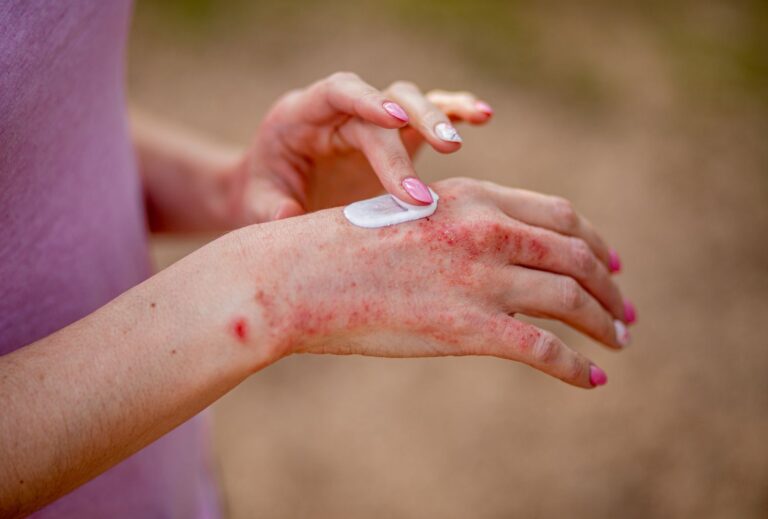Table of Contents
When it comes to skin needs, there can be a lot of confusion. Many people are unsure whether they should use eczema cream or moisturizing cream.
But determining the right product for your skin is not an easy task. It requires understanding which type of skin you have and what its requirements are to ensure that you get the best result from the products you are using.
This article will provide insight into how to determine your skin needs so that you can make informed decisions when selecting eczema cream or moisturizing cream.
Understanding Eczema: Causes, Symptoms, and Treatments

Understanding eczema can be complex, as it is a condition that affects people in different ways. It is important to understand the possible causes of eczema, its symptoms, and the available treatments so that you can make informed decisions about how to best manage your skin health.
Common triggers for eczema include environmental allergens such as pollen or pet dander; contact with certain fabrics or detergents; bacteria and viruses; stress; and dietary choices like dairy products or foods high in sugar content.
Symptoms may include dryness, itchiness, scaling (scaly patches) of the skin, reddish-brown discoloration of affected areas, swelling/blistering/oozing/crusted lesions due to scratching etc., thickening & darkening of skin texture over time due to chronic scratching etc., rough leathery patches caused by frequent rubbing or scratching etc., hair loss at affected sites due to excessive itching etc., infection (bacterial & viral).
Treatments vary depending on severity but may include topical ointments & creams containing active ingredients like colloidal oatmeal for soothing relief along with lifestyle changes such as avoiding potential trigger factors identified through proper diagnosis made by a doctor/dermatologist.
Understanding these issues will help you choose an appropriate treatment option tailored towards an individual’s unique needs while also ensuring proper consultation is sought out before commencing any kind of treatment regimen recommended!
Natural Ingredients to Look for in Eczema or Moisturizing Creams
When it comes to choosing an eczema or moisturizing cream, natural ingredients are key. Natural ingredients provide essential vitamins and minerals that help to nourish the skin.
Here are some of the top ingredients you should look for when selecting a product:
- Avocado Oil – Rich in Vitamins A, D, E & K as well as fatty acids this oil helps protect your skin moisture barrier while providing anti-inflammatory benefits that help calm irritation associated with eczema flareups
- Coconut Oil – Packed full of lauric acid (an essential fatty acid) coconut oil has potent antibacterial properties which make it useful for treating bacterial infections often associated with more extreme cases of Eczema. Its high content of saturated fats also makes this an ideal hydrating agent aiding not only those suffering from Eczema but all types of dehydrated skin!
- Jojoba Oil – This oil is rich in Omega 6 fatty acids which help rebuild healthy cells while maintaining softness and flexibility within them; making jojoba oil great at restoring balance within irritated areas due to eczema outbreaks.
- Shea Butter – Rich in Vitamin E, this ingredient is known for its anti-inflammatory properties as well as its ability to soothe and soften the skin even after it has been damaged due to irritation from eczema flareups. It also acts as a protective barrier on the outer layers of the epidermis helping lock in moisture while providing relief from itching associated with dryness.
- Aloe Vera – Aloe vera contains compounds that can reduce inflammation, relieve pain, and protect against bacteria and fungi. It also helps keep skin hydrated by reducing water loss from its surface layer to promote the healing of dry patches caused by eczema or moisture deprivation.

Tips for Managing Dryness from Eczema and Protecting Skin from Irritation
When it comes to managing dryness and irritation from eczema, there are a few tips that can help you protect your skin. First, make sure to use a gentle cleanser without harsh chemicals when washing the affected area.
Avoiding fragrances and dyes is also important as these can further irritate the skin. Second, be sure to apply an emollient or moisturizer after bathing or showering.
This helps keep moisture in the skin and prevents additional dryness. Third, try using bath oils if available- they help seal in moisture while washing away dirt and sweat which can exacerbate symptoms of eczema.
Finally, consider applying cool compresses on areas of intense itchiness; this will provide immediate relief but do not use hot water as this may cause more harm than good! All in all, following these simple steps, should help manage your dryness from eczema while protecting your skin from irritation.
Conclusion

Choosing the right skincare products can be confusing, especially when it comes to eczema and moisturizing creams. It’s important to understand your specific skin needs to determine which product is best for you.
Eczema cream is designed to tackle redness, itchiness, dryness, and irritation associated with the condition while a moisturizing cream will help restore hydration levels on normal or combination skin types.
The best eczema cream for your individual needs may depend on factors like the severity of symptoms and personal preferences. Ultimately, it’s important to experiment with different solutions until you find one that works best for you so that you can achieve healthy-looking skin without any further discomfort or distress caused by eczema flare-ups.

